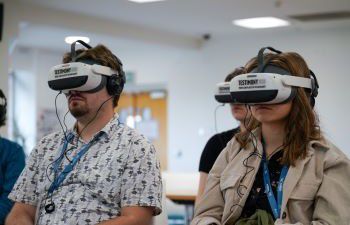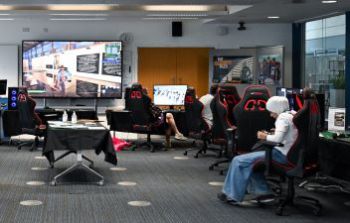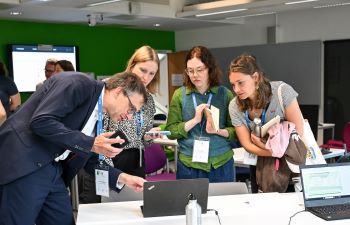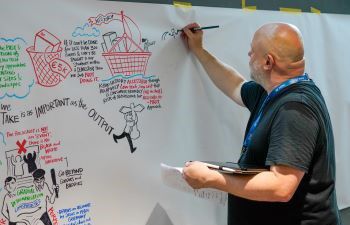Sussex hosts groundbreaking event on global approaches to Holocaust memory in the digital age
Posted on behalf of: Internal Communications
Last updated: Thursday, 17 July 2025




The University recently hosted a major international event exploring how digital technologies can help preserve Holocaust memory for future generations.
The Connective Holocaust Commemoration Expo 2025, held over three days on campus, brought together 180 participants including experts from more than 30 countries. Attendees included academics, students, artists, educators, digital professionals, and funders. The event was organised by the Landecker Digital Memory Lab, which is based at Sussex and funded by the Alfred Landecker Foundation, in Berlin. The Lab looks at digital innovation and the intersection with Holocaust memory, encompassing artificial intelligence, film, virtual reality, augmented reality, apps, digital exhibitions, websites, 360 survivor testimony and more.
The Expo, which featured a games arcade, exhibition hall and a virtual reality suite with screenings of immersive films, was the first of its kind, aiming to break down barriers between disciplines and spark new collaborations. It featured a wide range of activities including keynote talks, panel discussions, digital skills workshops, and hands-on sessions using computer games.
The Expo also marked the launch of two major new resources from the Landecker Digital Memory Lab:
- Digital Memory Dialogues – an innovative online publishing platform for open discussion on digital Holocaust memory, featuring contributions from academics, game designers, and heritage experts. This is an open resource that anyone can read. The first series, on computer games, has just concluded and the next, on AI, begins this autumn.
- Digital Memory Database – the world’s first database of digital Holocaust memory projects, from the 1990s to today, including interviews with creators and archived demonstrations of projects
The event was timely, against a backdrop of declining numbers of Holocaust survivors, the 80th anniversary of the end of World War Two and increasing politicisation of the Holocaust. With a growing urgency to find new ways to keep Holocaust memory alive, especially for younger generations, the event also gave Sussex students a chance to engage with cutting-edge research and global experts, while contributing to meaningful conversations about memory, technology, and education.
Professor Victoria Grace Richardson-Walden, Director of the Landecker Digital Memory Lab and Professor of Digital Memory, Heritage, and Culture (School of Media, Arts and Humanities) said: “Increasingly the Holocaust is being politicised. The need to enhance the visibility of nuanced, truthful but engaging presentations of this past to keep it relevant and to resist distortion has never been more urgent. Currently, the digital Holocaust memoryscape is scattered, efforts are duplicated and resources not maintained. The Expo offered a unique opportunity to bring all the actors in this field together, from across the globe, across disciplines and sectors, to share what we’re working on and to move towards a more connective future.”
As well as keynote speeches, panels and roundtable discussions, other highlights included:
- a games arcade and virtual reality booths showcasing interactive Holocaust memory projects
- a demo of a Holocaust Museum built inside the popular computer game Fortnite
- a masterclass using 3D film and survivor testimony as a springboard for discussion
- a showcase of the progression of digital projects from the Anne Frank House from 1990s CD-ROMs to modern virtual reality
- a ‘hack’ event pairing digital creatives with heritage professionals to develop new ideas
Keynote speakers included Paul FMJ Verschure (Universidad Miguel Hernandez de Elche) who spoke about ‘Conserving and Communicating the Indescribable: Attempts to Shape the Future Memory of the Holocaust and Nazi Crimes’ and Eva Pfanzelter (University of Innsbruck), who spoke about ‘Pixels and Hashtags of the Past: The Holocaust in the Digital Age’.
The Connective Holocaust Commemoration Expo 2025 is the first in a series of three. The next events will take place in Germany in 2027 and Serbia in 2029.